The giant cicada, Quesada gigas, has returned to Texas after 50 years!
Here’s a link:
Giant Cicada / Chicharra Grande
Thanks to Roy Troutman and Mike Quinn.
Bonus:
The giant cicada, Quesada gigas, has returned to Texas after 50 years!
Here’s a link:
Giant Cicada / Chicharra Grande
Thanks to Roy Troutman and Mike Quinn.
Bonus:
In a few weeks you might see some Magicicada stragglers in areas that saw the Brood X emergence back in 2004. If you see any, let us know.
Update: some exciting news in the comments (before I accidentally deleted the original article):
Our 2006 straggler hunt has been very successful— much more successful than our 2005 Brood XI hunt.
Our group found M. septendecim (XIII), M. tredecassini (XIX), M. tredecim, M. neotredecim, M. tredecassini, and M. tredecula (XXIII), and unidentified nymphal skins, as well as a possible M. cassini (X) straggler— all on a 3-day Midwestern trip. Although most sightings consisted of isolated or small numbers of individuals, two emergences— one at Moody Cemetary in Greene-Sullivan State Forest, Indiana (mostly M. neotredecim), and one at the Vectren Energy plant entrance, near Yankeetown (east of Evansville) IN (mostly M. tredecassini) were substantial enough that there were periods of continuous calling. Not bad for an “off” year!
Complete records will be incorporated into the Magicicada database on Cicada Central as soon as some server issues are solved. If you have records that you’d like to put in the database, send the details (species present, approximate numbers of individuals), the complete locality info (including lat. and lon. if you have it), the date, and your complete name to me at the University of Connecticut (email is just firstname.lastname@uconn.edu).
John Cooley
Can you ID this cicada from Bangkok, Thailand? Santisuk Vibul (the photographer) and I would be greatly pleased it your could.
Update: Here’s the ventral view, David:

Update: More Photos! NEW! Santisuk Vibul’ s Cicada Photos from Bangkok, Thailand.
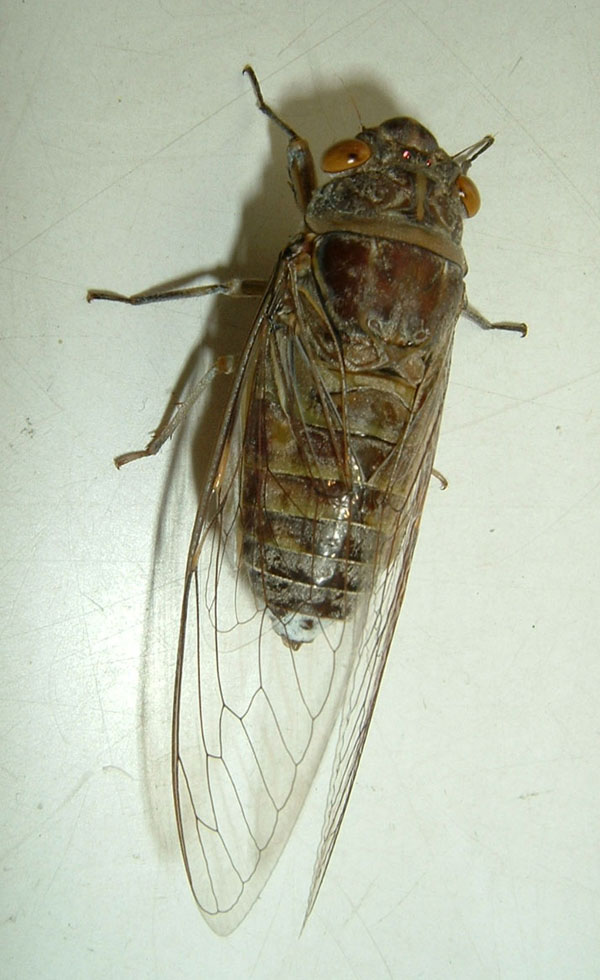
Some more info:
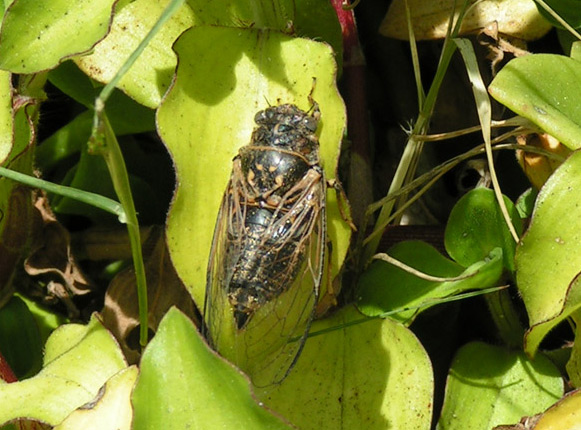
This photo was taken on May 28th, in Carlsbad, CA by Rebecca. Thanks Rebecca!
Originally I had this labeled as O. rimosa, but it is not.
This June marks the 10th year of this Cicada Mania web site. It was 10 years ago that I created the original Cicada Mania logo, and posted a bunch of cicada pictures from a friend’s wedding. Not as cool as the 17 year anniversary, but impressive none the less.
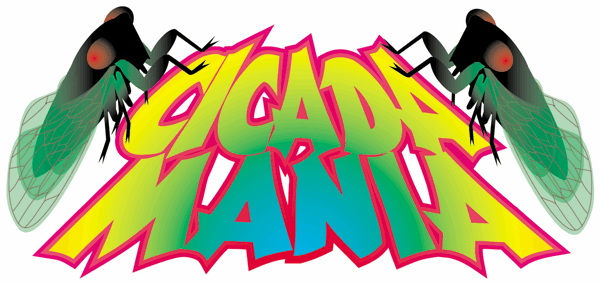
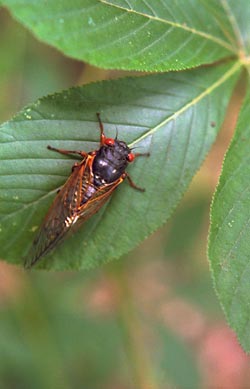
We have four new Roy Troutman galleries of restored images from the 1980’s and early 1990’s!
NEW! Roy Troutman’s Cicada Photos. Assorted cicadas photos from the 1980s!
NEW! Roy Troutman’s Cicada Photos. Brood X photos from 1987 and 1988
NEW! Roy Troutman’s Cicada Photos. Brood XIV cicada photos from 1990-91
The Brood X: Year of the Cicada movie is playing noon Monday (3/20) in the Charles Sumner Museum and Archives, 1201 17th St, N.W., Washington, D.C. (the address has been updated).
A story about the movie in the Gazette.net (thanks Dan Threadwell).
Another article in the Washington Post (thanks Roy Troutman).
The movie features about 15 minutes of Roy Troutman’s cicada footage.
If someone gets to see it, let us know.
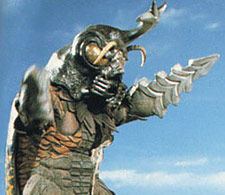 DARPA is soliciting research proposals for creating cyborg insects, which would presumably be used for military and paramilitary applications. I’m not sure whether I should be excited or terrified. Imagine armies of cicada cyborgs spying on enemies with tiny cameras and deafening enemy troops with robotically-enhanced screeching power. (story found on BoingBoing.)
DARPA is soliciting research proposals for creating cyborg insects, which would presumably be used for military and paramilitary applications. I’m not sure whether I should be excited or terrified. Imagine armies of cicada cyborgs spying on enemies with tiny cameras and deafening enemy troops with robotically-enhanced screeching power. (story found on BoingBoing.)
From this page on the Darpa site:
The Defense Advanced Research Projects Agency (DARPA) is soliciting research proposals in the area of Hybrid Insect MEMS. Proposed research should investigate innovative approaches that enable revolutionary advances in science, devices or systems. Specifically excluded is research, which primarily results in evolutionary improvement upon existing state-of-the-art.
DARPA seeks innovative proposals to develop technology to create insect-cyborgs, possibly enabled by intimately integrating microsystems within insects, during their early stages of metamorphoses. The healing processes from one metamorphic stage to the next stage are expected to yield more reliable bio-electromechanical interface to insects, as compared to adhesively bonded systems to adult insects. Once these platforms are integrated, various microsystem payloads can be mounted on the platforms with the goal of controlling insect locomotion, sense the local environment, and scavenge power. Multidisciplinary teams of engineers, physicists, and biologists are expected to work together to develop new technologies utilizing insect biology while developing foundations for the new field of insect cyborg engineering. The HI-MEMS may also serve as vehicles to conduct research to answer basic questions in biology.
The final demonstration goal of the HI-MEMS program is the delivery of an insect within five meters of a specific target located at hundred meters away, using electronic remote control, and/or global positioning system (GPS). Although flying insects are of great interest (e.g. moths and dragonflies), hopping and swimming insects could also meet final demonstration goals. In conjunction with delivery, the insect must remain stationary either indefinitely or until otherwise instructed. The insect-cyborg must also be able to transmit data from DOD relevant sensors, yielding information about the local environment. These sensors can include gas sensors, microphones, video, etc.
Here’s an excellent cicada website from Japan. This site features four gallerys of cicada photos, and a distribution map of Japanese cicadas. Thanks to Nanami Higashino for creating such a fine website.
Holophonic cicada sounds from Vietnam (about 1/3 of the way down the page). Holophonic Sound uses the same “multiple exposure” premise that is used to create holographic images. More about holophonic audio.